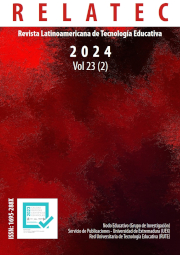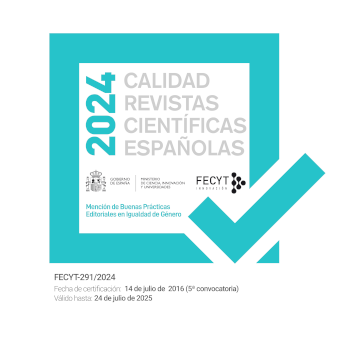Indicadores de aprendizaje adaptativo en entornos virtuales de aprendizaje: Revisión Sistemática de la Literatura
DOI:
https://doi.org/10.17398/1695-288X.23.2.69Palabras clave:
Evaluación Adaptativa; Instrucción asistida por computadora; Actividades Individuales; instrucción individual; Actividades de aprendizajeResumen
Las Tecnologías Digitales de la Información y la Comunicación actúan como aliadas del contexto educativo, dinamizándolo a través de los Entornos Virtuales de Aprendizaje. El sistema adaptativo se basa en soluciones/herramientas tecnológicas, que permiten personalizar los procesos de enseñanza según las singularidades del alumno. Por lo tanto, llevamos a cabo una Revisión Sistemática de la Literatura (RSL) para aclarar qué indicadores de desempeño educativo son los más utilizados para guiar el aprendizaje adaptativo en entornos virtuales de aprendizaje. Para eso, adoptamos los principios de Preferred Reporting Items for Systematic Reviews and Meta-Analyses (PRISMA) para nuestro protocolo de revisión sistemática, y como soporte operativo utilizamos la herramienta en línea Parsifal. Los trabajos seleccionados y filtrados por la evaluación cualitativa, en su mayoría, presentan el error y el acierto como métrica para decidir qué camino debe tomar el estudiante y así permitir que se produzca el aprendizaje adaptativo en entornos virtuales de aprendizaje. Así, queda mucho por implementar en cuanto a la adaptabilidad del aprendizaje en entornos virtuales, ya que la mayoría de los indicadores utilizados para dirigir las actividades son aciertos y errores, considerando métricas individualizadas, en lugar de considerar un conjunto integrado de estos para una evaluación más holística del aprendizaje.
Descargas
Referencias
Azzi, I., Jeghal, A., Radouane, A. et al. (2020). A robust classification to predict learning styles in adaptive E-learning systems. Educ Inf Technol 25, 437–448. https://doi.org/10.1007/s10639-019-09956-6
Barbaguelatta D. E., Mellado S. R., Diaz B. F., Cubillos F.C., (2018). X9: An Adaptive Learning Platform for Geometry at School Level. 37th International Conference of the Chilean Computer Science Society (SCCC), 2018, pp. 1-9. DOI: 10.1109/SCCC.2018.8705242
Behar, Patrícia Alejandra. (2013) Competências em educação à distância. Porto Alegre, Penso, 312 p. https://doi.org/10.15448/2179-8435.2014.2.17803
Cai, R., (2018). Adaptive Learning Practice for Online Learning and Assessment. In Proceedings of the 2018 International Conference on Distance Education and Learning (ICDEL '18). Association for Computing Machinery, New York, NY, USA, 103–108. https://doi.org/10.1145/3231848.3231868
Camillo, E. J., & Raymundo, G. M. C. (2019). Avaliação formativa na EAD: uma forma eficaz para (re) construção do conhecimento? Revista Exitus, 9(3), 476-505. DOI: https://doi.org/10.24065/2237-9460.2019v9n3ID925
Chrysafiadi, K., Troussas, C., Virvou, M., (2018). A Framework for Creating Automated Online Adaptive Tests Using Multiple-Criteria Decision Analysis. IEEE International Conference on Systems, Man, and Cybernetics (SMC), pp. 226-231. DOI: 10.1109/SMC.2018.00049
D'aniello, G., De Falco, M., Gaeta, M.; Lepore, M.; (2020). Feedback generation using Fuzzy Cognitive Maps to reduce dropout in situation-aware e-Learning systems.IEEE Conference on Cognitive and Computational Aspects of Situation Management (CogSIMA), 202, pp. 195-199. DOI: 10.1109/CogSIMA49017.2020.9216177
Despotovic-zrakic, M. et al. (2012). Providing Adaptivity in Moodle LMS Courses. Educational Technology & Society, v. 15 n. 1, p. 326–338.
Dolores Lers, Mara Luisa Sein-Echaluce, Miguel Hernández, and Concepción Bueno. (2017). Validation of indicators for implementing an adaptive platform for MOOCs. Comput. Hum. Behav. 72, C (July 2017), 783–795. DOI: https://doi.org/10.1016/j.chb.2016.07.054
Dounas, L., Salinesi, C., & El Beqqali, O. (2019). Requirements monitoring and diagnosis for improving adaptive e-learning systems design. Journal of Information Technology Education: Research, 18, 161-184. https://doi.org/10.28945/4270
Fontaine G, Cossette S, Maheu-Cadotte MA, Mailhot T, Deschênes MF, Mathieu-Dupuis G. (2017). Effectiveness of Adaptive E-Learning Environments on Knowledge, Competence, and Behavior in Health Professionals and Students: Protocol for a Systematic Review and Meta-Analysis. JMIR Res Protoc.Jul 5;6(7):e128. DOI: 10.2196/resprot.8085
Ghergulescu, I., Flynn, C., O'Sullivan, C., van Heck, I., and Slob, M. (2021). A Conceptual Framework for Extending Domain Model of AI-enabled Adaptive Learning with Sub-skills Modeling. In Proceedings of the 13th International Conference on Computer Supported Education (CSEDU 2021) - Volume 1, pages 116-123 ISBN: 978-989-758-502-9. DOI: 10.5220/0010451201160123
Gomes, Alex Sandro; Pimentel, Edson Pinheiro. Ambientes. (2021). Virtuais de Aprendizagem para uma Educação mediada por tecnologias digitais. In: Pimentel, Mariano; Sampaio, Fábio F.; Santos, Edméa (Org.). Informática na Educação: ambientes de aprendizagem, objetos de aprendizagem e empreendedorismo. Porto Alegre: Sociedade Brasileira de Computação (Série Informática na Educação CEIE-SBC, v.5) Disponível em: https://ieducacao.ceie-br.org/ava
Hamada, M., & Hassan, M. (2017). An Enhanced Learning Style Index: Implementation and Integration into an Intelligent and Adaptive e-Learning System. Eurasia Journal of Mathematics, Science and Technology Education, 13(8), 4449-4470. DOI:10.12973/eurasia.2017.00940a
Hasibuan, M. S.; Nugroho, L.; Santos A, P.;(2018). Prediction Learning Style Based on prior Knowledge for Personalized Learning, 4th International Conference on Science and Technology (ICST), Yogyakarta, pp. 1-5. DOI: 10.1109/ICSTC.2018.8528572
Inoue Y. (2012). Virtual Reality Learning Environments. In: Seel N.M. (eds) Encyclopedia of the Sciences of Learning. Springer, Boston, MA. https://doi.org/10.1007/978-1-4419-1428-6_651
Krechetov, I.; Romanenko, V.; (2020). Implementing the adaptive learning techniques, Educational Studies Moscow, nº. 2, pp. 252–277. [Online]. Available: https://vo.hse.ru/en/2020–2/373410249.htm DOI: 10.17323/1814-9545-2020-2-252-277
Li, L. X.; Abdul Rahman, S.S.; (2018). Students’ learning style detection using tree augmented naive Bayes. R Soc Open Sci.; Published 24 Jul. https://doi.org/10.1098/rsos.172108
Li, F., He, Y., & Xue, Q. (2021). Progress, Challenges and Countermeasures of Adaptive Learning: A Systematic Review. Educational Technology & Society, 24(3), 238–255. https://www.jstor.org/stable/27032868
Maravanyika, M.; Dlodlo, N. and Jere, N.;(2017) An adaptive recommender-system based framework for personalised teaching and learning on e-learning platforms, 2017 IST-Africa Week Conference (IST-Africa), pp. 1-9. DOI: DOI:10.23919/ISTAFRICA.2017.8102297
Martin, F., Chen, Y., Moore, R.L. et al. (2020). Systematic review of adaptive learning research designs, context, strategies, and technologies from 2009 to 2018. Education Tech Research Dev 68, 1903–1929 DOI: 10.1007/s11423-020-09793-2
Miquelante, M. A., Pontara, C. L., Cristovão, V. L. L., Silva, R. O. da. (2017). As modalidades da avaliação e as etapas da sequência didática: articulações possíveis. Trabalhos em Linguística Aplicada, Campinas, SP, v. 56, n. 1, p. 259–299, 2017. Disponível em: https://periodicos.sbu.unicamp.br/ojs/index.php/tla/article/view/8650771.
Moraes, S. B. A. (2014). Notas Sobre a Avaliação da Aprendizagem em Educação a Distância. EaD Em Foco, 4(2). https://doi.org/10.18264/eadf.v4i2.229
Moresco, S.F.S.; Behar, P.A. (2003). ROODA Tekton: uma proposta pedagógica no ambiente virtual de aprendizagem ROODA. Simpósio Brasileiro de Informática na Educaçã, 14. Rio de Janeiro.
Page, M.J., Mckenzie, J.E., Bossuyt, P.M., Boutron, I., Hoffmann, T.C., Mulrow, C.D., Shamseer, L., Tetzlaff, J.M., Akl, E.A., Brennan, S.E., et al. (2021). The prisma 2020 statement: an updated guideline for reporting systematic reviews. BMJ 2021; 372: n 71.
https://doi.org/10.1136/bmj.n71
Pitigala, L.P.; Gunawardena, L.; Hirakawa, M. (2013). A framework for adaptive learning management systems using learning styles. International Conference on Advances in ICT for Emerging Regions, ICTer - Conference Proceedings. 261-265. http://dx.doi.org/10.4038/icter.v7i2.7153
Rezaei, M. S., & Montazer, Gholam Ali. (2016). An automatic adaptive grouping of learners in an e-learning environment based on fuzzy grafting and snap-drift clustering, International Journal of Technology Enhanced Learning, vol. 8, no. 2, pp. 169–186. DOI: https://doi.org/10.1504/IJTEL.2016.078090
Shabbir, S., Ayub, M.A., Khan, F.A. And Davis, J. (2021). Short-term and long-term learners’ motivation modeling in Web-based educational systems. Interactive Technology and Smart Education, Vol. ahead-of-print No. ahead-of-print. https://doi.org/10.1108/ITSE-09-2020-0207
Sheeba, T., Krishnan, R. (2018). Prediction of student learning style using modified decision tree algorithm in e-learning system. International Conference on Data Science and Information Technology, 85–90, July. https://doi.org/10.1145/3239283.3239319
Shemshack, A., Spector, J.M. (2020). A systematic literature review of personalized learning terms. Smart Learn. Environ. 7, 33. DOI: 10.1186/s40561-020-00140-9
Shubin, I., Skovorodnikova, V., Kozyriev, A., Pitiukova, M. (2019). Mining methods for adaptation metrics in e-learning, vol.2362, [On-line].
Skinner, B. F. Ciência e Comportamento Humano. (1970). Brasília: Ed. UnB/ FUNBEC, (1953), 1970.
Su, C. (2017). Designing and Developing a Novel Hybrid Adaptive Learning Path Recommendation System (ALPRS) for Gamification Mathematics Geometry Course. Eurasia Journal of Mathematics, Science and Technology Education, 13(6), 2275-2298. DOI: 10.12973/eurasia.2017.01225a
Tnazefti - Kerkeni, I., Belaid, H. And Talon, B. (2020). An Adaptive Learning System based on Tracking. In Proceedings of the 12th International Conference on Computer Supported Education - Volume 2: CSEDU, ISBN 978-989-758-417-6; ISSN 2184-5026, pages 455-460. DOI: 10.5220/0009571604550460
Y. Qu and O. Ogunkunle, "Enhancing the Intelligence of the Adaptive Learning Software through an AI assisted Data Analytics on Students Learning Attributes with Unequal Weight," 2021 IEEE Frontiers in Education Conference (FIE), Lincoln, NE, USA, 2021, pp. 1-6, doi: 10.1109/FIE49875.2021.9637387
Yan, W., Yiping, L., Tingting, Z. and Jianzhong, C. (2010). Research of Data Model of SCORM Run-time Environment. 3rd International Conference on Information Management, Innovation Management and Industrial Engineering, pp. 240-243. DOI: 10.1109/ICIII.2010.222
Wohlin, C. (2014). Guidelines for snowballing in systematic literature studies and a replication in software engineering, in: Proceedings of the 18th international conference on evaluation and assessment in software engineering, pp. 1–10. DOI: https://doi.org/10.1145/2601248.2601268
Zaoud, M., & Belhadaoui, H. (2020). Adaptive E-learning: Adaptation of Content According to the Continuous Evolution of the Learner During his Training. Proceedings of the 3rd International Conference on Networking, Information Systems & Security. https://doi.org/10.1145/3386723.3387890
Zawacki - Richter, O., Marín, V. I., Bond, M. et al. (2019). Systematic review of research on artificial intelligence applications in higher education – where are the educators? Int J Educ Technol High Educ 16, 39. DOI: https://doi.org/10.1186/s41239-019-0171-0
Zhao, L., Wang, H. (2019). Research on Adaptive Learning System Based on Three Core Modules. 10th International Conference on Information Technology in Medicine and Education (ITME), pp. 447-452.
Descargas
Publicado
Número
Sección
Licencia
Derechos de autor 2024 Andréia dos Santos Sachete, Raquel Salcedo Gomes, Alberto Bastos Canto Filho, José Valdeni de Lima

Esta obra está bajo una licencia internacional Creative Commons Atribución-NoComercial-SinDerivadas 4.0.
Los autores/as que publiquen en esta revista aceptan las siguientes condiciones:
1. Los autores/as conservan los derechos de autor y ceden a la revista el derecho de la primera publicación, con el trabajo registrado con la licencia Creative Commons Reconocimiento-NoComercial-SinObraDerivada 4.0 International (CC BY-NC-ND), que permite a terceros utilizar lo publicado siempre que mencionen la autoría del trabajo y a la primera publicación en esta revista.
2. Los autores/as pueden realizar otros acuerdos contractuales independientes y adicionales para la distribución no exclusiva de la versión del artículo publicado en esta revista (p. ej., incluirlo en un repositorio institucional o publicarlo en un libro) siempre que indiquen claramente que el trabajo se publicó por primera vez en esta revista.
3. Se permite y recomienda a los autores/as a publicar su trabajo en Internet (por ejemplo en páginas institucionales o personales) antes y durante el proceso de revisión y publicación, ya que puede conducir a intercambios productivos y a una mayor y más rápida difusión del trabajo publicado (vea The Effect of Open Access).









